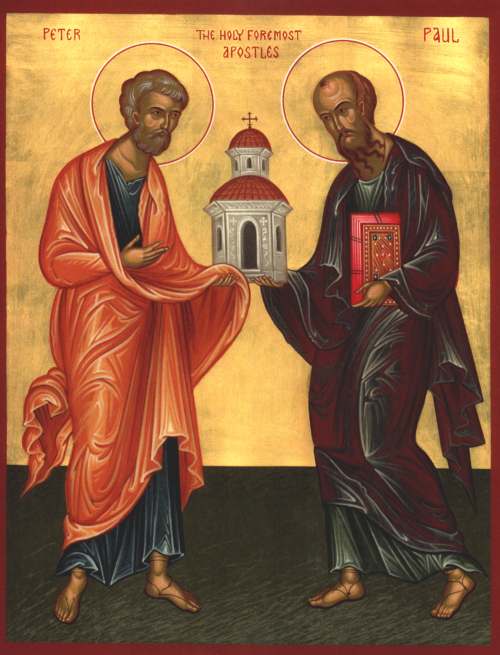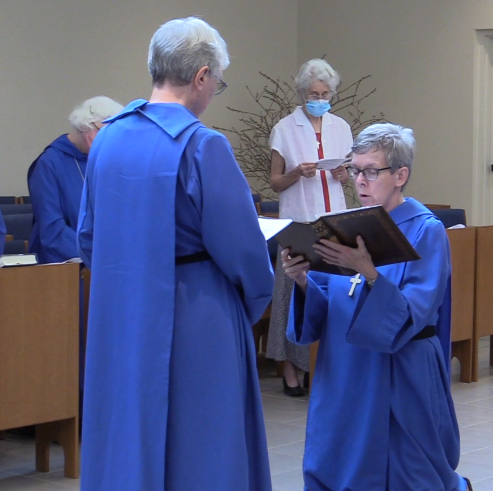By Sr. Wendy Grace, SSJD.
Ezekiel 34:11-162 Timothy 4:1-8 Psalm 87 John 21:15-19
Today we observe the feast of St. Peter and St. Paul and, more significantly for SSJD today, the first profession of Sr. Suzanne Marie. The Gospel and Epistle readings present Peter and Paul almost as bookends – Peter at the beginning of his ministry and Paul at the end of his. One is at the end, one is at the beginning and both are in liminal space – that time when we are no longer what we were but also not what we will be. Suzanne Marie is also in a liminal space – no longer a novice but also not yet a professed sister of St. John the Divine.
One way to explore this liminal space is through the idea of witness. Peter and Paul are remembered by the church for many things; their lives but also their deaths. Both were martyred for their faith and the word ‘martyr’ has its root in a Greek word meaning ‘witness’.
A witness can be a person who sees an event take place, a person who provides sworn testimony in a court of law, a person who is present at the signing of a document and who provides her own signature in confirmation. The word witness can also mean an open profession of religious faith through words and actions. What is the witness of the words and actions of Peter and Paul as we encounter them in liminal space against the background of both Scripture and history?
The four verses from John chapter 21 tell us of a conversation between Jesus and Peter. This conversation takes place after Peter’s denial of Jesus and Jesus’ subsequent death and resurrection. Jesus does almost all of the talking. Peter speaks three times but says very little. Twice Peter says “Yes, Lord; you know that I love you” and the third time he speaks he says, “Lord, you know everything; you know that I love you.” Peter in this brief encounter is recommissioned by Jesus. Peter is not only forgiven but he is invited to participate in taking care of Jesus’ flock, to be a part of the work which still needs to be done. Jesus speaks of ‘my lambs’ and ‘my sheep’ but he asks Peter to tend and feed them. Peter witnesses to us of the all too familiar experience of failure but also of God’s forgiveness and willingness to restore relationships with us.
Peter doesn’t have a dramatic conversion experience like Paul but he is changed. The Peter of the Gospels is not the same Peter who is portrayed in the Acts of the Apostles. Although Peter in Acts is described as, ‘uneducated and ordinary’ he is also shown as a courageous and compelling individual. He is challenged, arrested, imprisoned, flogged and repeatedly warned to stop proclaiming Jesus as the Messiah but he continues to carry out his commission.
In the first letter to Timothy Paul vividly describes himself as ‘formerly a blasphemer, a persecutor and a man of violence’. As character references go it is not a good one. But that is the person who God stopped on the road to Damascus and called to participate in spreading the news of the Gospel, the person who was ‘chosen to be an instrument to go to the Gentiles’.
In the Epistle and the Gospel, we see the shadow of death hanging over Peter and Paul but only in the Epistle do we learn more of the daily cost of following Jesus. Paul’s advice to Timothy speaks of the difficulty of proclaiming the message. Timothy is exhorted to be persistent, persuasive, critical when necessary, encouraging, patient, sober and persevering in the face of suffering. Paul describes his own experience as being poured out like a drink offering – he has given himself lavishly, wholeheartedly and completely to the cause of the Gospel.
Paul says ‘I have fought the good fight, I have finished the race, I have kept the faith’. There are at least two meanings to the expression ‘I have kept the faith.’ One meaning is that Paul is saying he has maintained his belief in the One who called him until the end of his life and another meaning is that he has ‘kept’, that is preserved, the truth and is passing it on.
As much as Peter and Paul are witnesses to their faith through their lives and actions so too are we witnesses. Our lives are a witness, first as baptized Christians and then as women seeking to live out our baptismal promises through the vows of poverty, chastity and obedience. Our Rule states, “In poverty we bear witness that God is our whole support,” “In chastity we bear witness that God is our whole love,” “By our obedience we bear witness that God is our whole life.” All the Sisters who have gone before us have witnessed with their lives to their desire to “live to the Glory of God in fulfillment of the two-fold law of love.” All the Sisters who have gone before us have ‘kept the faith’. They kept faith with God and with each other and they keep faith with us. The form of the vows we will hear today is, ‘I promise to you my Sisters, before Almighty God, and the whole company of heaven’. Our vows stretch back in time, are a present reality and a future promise.
Today we are all witnesses to a first profession of vows. Suzanne Marie will be witnessing to her sense of a call to religious life, her answer to that call within the context of SSJD. She will be witnessing to those of us who are physically present, those Sisters who have gone before and those who will come after her.
We remember Peter and Paul not only because they died for their faith but also because they lived for their faith. Their lives bore witness to their faith in the God who creates, redeems and sustains; the God who loves, forgives, restores, calls and sends; the God who is with us in all of our beginnings and endings and through all the times in between. Thanks be to God.




